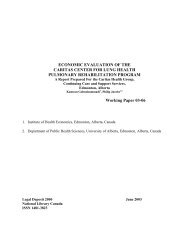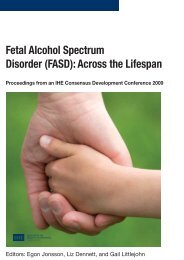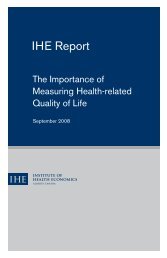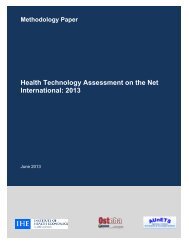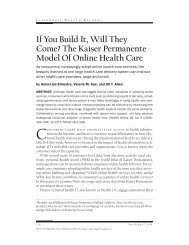Bariatric treatments for adult obesity - Institute of Health Economics
Bariatric treatments for adult obesity - Institute of Health Economics
Bariatric treatments for adult obesity - Institute of Health Economics
- No tags were found...
Create successful ePaper yourself
Turn your PDF publications into a flip-book with our unique Google optimized e-Paper software.
group as compared to the VBG group. The other trial did not find any significant differencebetween mini-gastric bypass patients and RYGB patients. Two trials used another <strong>obesity</strong>-specificmeasure—the Moorehead-Ardelt instrument—but none <strong>of</strong> the five domains showed significantresults.Of the three reviews on dietary therapy/physical exercise, while two reviews 56,58 did not look atHrQoL outcome, the third review 57 did not identify any data on HrQoL among included trials. Thereview 15 on behavioural therapy did not find any data on HrQoL. The three reviews 20,59,60 <strong>of</strong>anti<strong>obesity</strong> medications did not examine the effects <strong>of</strong> drugs on HrQoL.MortalityNo data were available on the effect <strong>of</strong> anti-<strong>obesity</strong> drugs on mortality or cardiovascular morbidity.The CADTH report 38 assessed overall mortality following bariatric surgeries. In the comparison <strong>of</strong>one surgery with another surgery or standard care (diet and exercise), an analysis <strong>of</strong> 23 RCTs withfollow-up <strong>of</strong> less than five years found no significant difference in mortality risk (30-day mortality,or mortality during follow-up) between any pair <strong>of</strong> interventions.An analysis <strong>of</strong> seven RCTs with 574 patients showed that the risk difference <strong>of</strong> death betweenlaparoscopic and open surgeries was not significant.Long-term outcomesOne systematic review 67 specifically examined the effect <strong>of</strong> bariatric treatment strategies on longtermoverall mortality. Eight prospective studies with a follow-up period <strong>of</strong> 5 years or longer wereincluded in this review (see Table T. F.4). This review assessed the effects <strong>of</strong> both intentional andunintentional weight loss, but did not clearly and consistently describe bariatric interventions used inthe eight primary studies.Results <strong>for</strong> women onlyTwo studies reported the mortality risk with weight loss <strong>for</strong> white women in the United States. Onestudy showed significantly increased mortality <strong>for</strong> all overweight or obese women with weight loss.However, because the reference group was those <strong>of</strong> normal weight with small weight loss, the twogroups were not comparable. The other study involved women who were at least overweight(BMI > 25 kg/m 2 ). In<strong>for</strong>mation about weight loss intention and <strong>obesity</strong>-related diseases wasobtained from each person. The study showed that, <strong>for</strong> those with <strong>obesity</strong>-related diseases and theintention to lose weight, the mortality risk significantly improved in women who lost 20 pounds ormore within 1 year, compared to those without weight change. However, <strong>for</strong> those who lost lessthan 20 pounds and who took more time (1 year or longer) to lose the weight, no significantdifference in mortality risk was found between the weight loss group and the group having noweight change.Results <strong>for</strong> men onlyThree studies examined the long-term effect <strong>of</strong> weight loss in men. One study included men whowere at least overweight (BMI > 25 kg/m 2 ). The intention <strong>of</strong> weight loss and the presence <strong>of</strong>comorbidities were considered separately. Compared to the weight-stable group, intentional weightloss <strong>of</strong> 20 pounds or more <strong>for</strong> longer than 1 year was detrimental <strong>for</strong> all men. Unintentional weightloss was also marginally detrimental. However, intentional weight loss <strong>of</strong> less than 20 pounds in menwith comorbidities did not show any detrimental effects.<strong>Bariatric</strong> <strong>treatments</strong> <strong>for</strong> <strong>adult</strong> <strong>obesity</strong> 88



